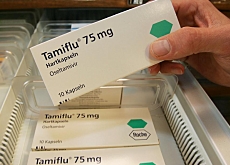Swiss stock up for times of crisis

Switzerland has stockpiled enough of the drug Tamiflu to treat one quarter of the population should bird flu become a human pandemic.
The country has a longstanding disaster preparedness strategy, which includes stocking up on rice, sugar, petrol and medicines to ensure that its citizens never go short.
Stockpiling is the job of the Federal Office for National Economic Supply. Currently it has SFr6 billion ($4.6 billion) worth of goods in its warehouses.
The supplies are meant to tide the country over in times when political or economic crises, natural disasters or terrorist attacks disrupt the flow of goods into the country.
Switzerland relies heavily on imports, especially as it has virtually no raw materials of its own.
Peter Graf, an office official, explained that stockpiling was initially a response to difficulties experienced during the 20th century.
With the advent of the Cold War, Switzerland started to increase its reserves.
“Nowadays stocks are not piled because of wars directly affecting Switzerland but for other types of problems such as boycotts or natural catastrophes,” Graf told swissinfo.
Hurricane Katrina
The country was recently called upon to help in the aftermath of Hurricane Katrina, which devastated parts of the United States last August. The hurricane disrupted production in oil refineries, prompting fears of shortages.
To counter the supply disruption, the International Energy Agency called on its members, among them Switzerland, to make crude oil and products from their reserves available.
The global market has led to a wide distribution of products, but has also created strong interdependencies between countries.
“Everything works on the just-in-time principle and the logistics sector has become weaker,” said Graf, adding that it only needs a small change in the situation for problems to become apparent.
In 2002, delivery problems experienced by a US company meant that a certain important type of antibiotic did not reach Switzerland. This was countered by the stockpiled supplies.
Three areas
The supply office concentrates on three main areas – food, energy and medicines.
Storerooms hold grains, rice, sugar and coffee. Among the medicines are antibiotics and Tamiflu.
The authorities decided back in 2004 to stockpile the anti-viral medication and they now have enough to treat 25 per cent of the population for six weeks.
But the most expensive items in the warehouses are energy products, such as petrol and heating oil.
“We review our strategy every five years,” said Graf. “It is done in such a way as to have what we need but not more than that.”
“At first, we had fuel reserves for 12 months, now it’s for four and a half months.”
This also makes it easier for the government to rein in costs, despite the fact that it does finance the stockpiles directly. The merchandise remains the property of the producers, distributors or importers, who fill up the stores on the government’s orders.
They are, in turn, reimbursed via a special fund made up from levies on imported goods.
Effect on prices
This has an effect on prices, meaning that the costs of compulsory stockpiling are passed on to the consumer, explains Graf.
“Drivers, for example, contribute to the financing of petrol reserves through [an extra cost of] 0.3 centimes per litre of fuel they buy.”
During non-crisis times, stockpiling, even at home, is not an issue for most people.
“People get very worried about supply questions but only when it is of topical interest,” said Graf.
“On the other hand, we try to have a long-term policy. If we had only decided to stock up on Tamiflu when everyone was talking about it and was trying to get hold of it, we would be lagging behind.”
swissinfo
Switzerland imports 40 per cent of its foodstuffs and 80 per cent of its energy.
Compulsory stockpiles are made up of rice, sugar, vegetable fats and oils, coffee, grains, fertilizer, petrol, heating oil, antibiotics and Tamiflu.
These total SFr6 billion.
There are enough food products for four months, fuel for 4.5 months, antibiotics for six months and Tamiflu for 25 per cent of the population for six weeks.
The Swiss Constitution ensures that the national supply of essential goods and services to the population in the event of a crisis, conflict or shortage coming from a disruption to the market economy, which cannot be remedied on its own.
Switzerland has few raw materials so stockpiles are especially needed in imported products, such as basic foodstuffs, energy and medicines.
The country ensures national economic supply through various international agreements. Of particular important is its membership of the International Energy Agency and the Partnership for peace.

In compliance with the JTI standards
More: SWI swissinfo.ch certified by the Journalism Trust Initiative











You can find an overview of ongoing debates with our journalists here . Please join us!
If you want to start a conversation about a topic raised in this article or want to report factual errors, email us at english@swissinfo.ch.